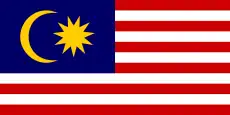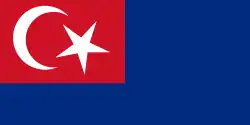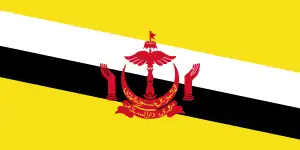Mohamed Noah Omar
Mohamed Noah bin Omar (Jawi: محمد نوح بن عمر; 13 August 1897 – 6 September 1991) was a Malaysian politician. He was one of the leading figures who founded the United Malays National Organisation (UMNO) and became the first Speaker of the Dewan Rakyat.
Mohamed Noah Omar | |
|---|---|
| محمد نوح عمر | |
| 1st Speaker of the Dewan Rakyat | |
| In office 1 September 1959 – 29 February 1964 | |
| Monarchs | Abdul Rahman Hisamuddin Syed Putra Jamalullail |
| Prime Minister | Tunku Abdul Rahman |
| Preceded by | Office established |
| Succeeded by | Syed Esa Alwee |
| 3rd President of the Dewan Negara | |
| In office 24 February 1969 – 28 July 1970 | |
| Monarch | Ismail Nasiruddin |
| Prime Minister | Tunku Abdul Rahman |
| Preceded by | Syed Sheh Hassan Barakbah |
| Succeeded by | Abdul Hamid Khan |
| Member of the Federation of Malaya / Malaysia Parliament for Johore Bahru Timor | |
| In office 1959–1964 | |
| Preceded by | Constituency established |
| Succeeded by | Fatimah Abdul Majid |
| Majority | 3,535 (1959) |
| Personal details | |
| Born | Mohamed Noah bin Omar 13 August 1897 Bandar Maharani, Muar, Johor |
| Died | 6 September 1991 (aged 94) Kuala Lumpur, Malaysia |
| Resting place | Makam Pahlawan, Masjid Negara, Kuala Lumpur |
| Political party | United Malays National Organisation (UMNO) (1946–1991) |
| Spouse(s) | Maimun Abdul Manaf Siti Amirah Kusuma |
| Relations | Abdul Razak Hussein (son-in-law) Hussein Onn (son-in-law) Najib Razak (grandson) Hishammuddin Hussein (grandson) Nazir Razak (grandson) Nazifuddin Najib (great-grandson) Onn Hafiz Ghazi (great-grandson) |
| Children | 5 (including Rahah, Suhailah) |
| Alma mater | Syrian Protestant College, Beirut, Lebanon |
Early life
Noah Omar was born in Bandar Maharani, Muar, Johor on 13 August 1897.[1] He is a descendant of the 17th century Bugis Raja Chempa.[2] His ancestors were the aristocratic Orang Kaya of Muar. He attended the Syrian Protestant College in Beirut, Lebanon, after which he acquired the nickname "Noah Beirut". After returning, he worked as a lorry driver and clerk before joining the Johor civil service.[3]
Noah married twice in a polygamous manner, firstly to Maimun Abdul Manaf (1903–1968) in 1921 until her death and then to Siti Amirah Kusuma (1916–2014). His children from his first marriage are Rahah, the widow of Tun Abdul Razak, who was 2nd Prime Minister from 1970 to 1976, Suhaila, the widow of Tun Hussein Onn, who was 3rd Prime Minister from 1976 to 1981, and Fakhriah who married Abdullah Ahmad, a member of the Johor royal court. Their grandsons, Najib Abdul Razak became the 6th Prime Minister, while Hishamuddin Hussein became a cabinet minister of different portfolios and is one of the leading UMNO leaders since the 1990s.[4] Noah and Siti Amirah had an elder child, Nabiha, who died at a young age.[3] Noah had only one son, Abu Rais, who died at his early age of 40. Siti Amirah Kusuma died on 17 July 2014 in Malaysia Airlines Flight 17 (MH17) tragedy at Donetsk Oblast, Ukraine.
Career
Politics
Noah was very active in the Malayan nationalist movement along with his contemporaries, Onn Jaafar, Haji Anwar bin Abdul Malik and Haji Syed Alwi bin Syed Sheikh al-Hadi. Together they founded UMNO on 1 May 1946 as a means to rally the Malays against the Malayan Union, which was perceived as threatening Malay privileges and the position of the Malay rulers.
After independence, he became the first Speaker of the Dewan Rakyat, the lower house of Parliament between 1959 and 1964. Subsequently, he was President of the Dewan Negara, the upper house, from 1968 to 1970.
Business
Noah together with Tan Sri Lim Goh Tong formed a private company called Genting Highlands Berhad (now Genting Group), which was set up on 27 April 1965 to construct Genting Highlands. Tan Sri Lim successfully obtained approval for the alienation of 12,000 acres (49 km2) and 2,800 acres (11 km2) of land from the Pahang and Selangor state governments respectively between the years 1965 and 1970. Its primary hill resort, Resort World Genting is currently Malaysia's only casino and highland resort. A mosque built at the hill station is named after him.
In 1970, Noah was appointed a director of MUI Group. He was appointed Chairman of the Group in 1980.[5]
Death
Noah died on 6 September 1991 in Kuala Lumpur, at the age of 94. He was buried at Makam Pahlawan near Masjid Negara, Kuala Lumpur.
Honours
 Malaya :
Malaya :
-_PMN.svg.png.webp) Commander of the Order of the Defender of the Realm (PMN) – Tan Sri (1963)[6]
Commander of the Order of the Defender of the Realm (PMN) – Tan Sri (1963)[6]
 Malaysia :
Malaysia :
 Recipient of the Malaysian Commemorative Medal (Gold) (PPM) (1965)
Recipient of the Malaysian Commemorative Medal (Gold) (PPM) (1965)
 Johor :
Johor :
 Second Class of the Sultan Ibrahim Medal (PIS II) (1947)[7]
Second Class of the Sultan Ibrahim Medal (PIS II) (1947)[7] Knight Commander Order of the Crown of Johor (DPMJ) – Dato' (1955)[8]
Knight Commander Order of the Crown of Johor (DPMJ) – Dato' (1955)[8] Knight Grand Commander Order of the Crown of Johor (SPMJ) – Dato' (1960)[9]
Knight Grand Commander Order of the Crown of Johor (SPMJ) – Dato' (1960)[9]_-_ribbon_bar.png.webp) Knight Grand Companion of the Order of Loyalty of Sultan Ismail of Johor (SSIJ) – Dato' (1977)
Knight Grand Companion of the Order of Loyalty of Sultan Ismail of Johor (SSIJ) – Dato' (1977)
Foreign honours
 Brunei :
Brunei :
 Second Class of the Order of Seri Paduka Mahkota Brunei (DPMB) – Dato Paduka (1960)[10]
Second Class of the Order of Seri Paduka Mahkota Brunei (DPMB) – Dato Paduka (1960)[10]
References
- Fawzia Abdullah (2010). The three swans : Fakhriah, Suhailah, Rahah. Petaling Jaya, Selangor: MPH Publishing. p. 26. ISBN 978-967-5222-79-5. OCLC 643766906.
- Siapa Mohamed Noah Omar? Archived 25 February 2014 at the Wayback Machine, Azman Anuar, 17 June 2012, Utusan Malaysia
- Jaaffar, Johan (5 June 2010). "Weaving the life stories of 'The Three Swans'". New Straits Times. p. 27.
- "Najib's three beloved 'swans'". The Malaysian Insider. 31 May 2010. Archived from the original on 9 August 2010. Retrieved 7 June 2011.
- Sharmini, P. (20 June 2012). "A man who loved life". New Straits Times. Archived from the original on 23 June 2012. Retrieved 20 June 2012.
- "Senarai Penuh Penerima Darjah Kebesaran, Bintang dan Pingat Persekutuan Tahun 1963" (PDF).
- John Victor Morais, Without Fear Or Favour: A Biography of Tan Sri Mohd. Noah, Utusan Printcorp, Kuala Lumpur, 1976, p. 136.
- "TWO NEW DATOS IN JOHORE HONOURS". The Straits Times. 18 September 1955. p. 3.
- "90 RECEIVE SULTAN'S C-DAY AWARDS". The Straits Times. 12 February 1960. p. 2.
- "MALAYA'S SPEAKER HONOURED AT BRUNEI INVESTITURE CEREMONY". The Straits Times. 25 September 1960. p. 11.